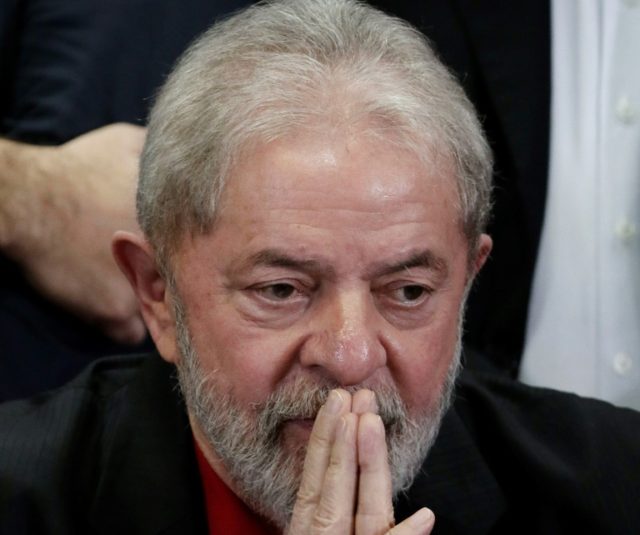Brasília (AFP) – Brazil’s Supreme Court began deliberations Wednesday on whether leftist former president Luiz Inacio Lula da Silva should start a 12-year prison sentence for corruption, potentially upending this year’s presidential election.
The 11 justices were to vote one by one in what was likely to be a lengthy session held under tight security, with police blocking all access roads to the building in the capital Brasilia.
Tension soared in Latin America’s biggest country ahead of the court showdown, with both backers and opponents of Lula — currently the heavy favorite for the October election — warning of a threat to democracy.
Late Tuesday, up to 20,000 people demonstrated in Brazil’s biggest city, Sao Paulo, to demand Lula go to prison and be barred from the election, with smaller rival rallies gathering in Brasilia on Wednesday.
There was also controversy after the commander of the army broke traditional non-interference in politics by appearing to call for Lula to be imprisoned, something Amnesty International criticized as a “threat to the democratic state of law.”
Lula, 72, was sentenced to 12 years and one month prison after being convicted last year of accepting a seaside apartment as a bribe from a major construction company seeking government contracts. He appealed in a lower court but lost.
Under current law, that means he should go immediately to prison, even while conducting further appeals in higher courts. However, Lula has asked the Supreme Court to grant him habeas corpus, allowing him to remain free while pursuing those appeals.
The court is believed to be evenly split on the issue, so that if only one judge changed position it would secure Lula’s temporary freedom, and boost his uphill bid for a third term in office.
If the court turns him down, he could face jail within days.
– Army general causes stir –
Lula left office after two terms between 2003-2010 as Brazil’s most popular president on record, but he has since turned into a hugely divisive figure, inspiring adoration on the left and hatred on the right.
The court has faced an avalanche of demands from the two sides, with more than 5,000 judges and prosecutors signing a petition for Lula to be imprisoned immediately.
On Wednesday, Prosecutor General Raquel Dodge said that allowing convicted criminals to stay free pending several appeals would “annihilate” the justice system.
However, the court also has to contend with the fact that Lula holds an overwhelming lead in opinion polls ahead of the October 7 election. And while Brazilians have gotten used to seeing much of their political class become embroiled in corruption scandals, there is no precedent for the imprisonment of a two-term former president.
Lula supporter Leonor Mata, 60, said in Sao Paulo that she was nervous about the outcome.
“I didn’t sleep last night. It is one of the worst days of my life,” she said at the steel workers’ union where Lula himself was expected to appear during the afternoon.
Adding to Brazil’s collective jitters was a tweet late Tuesday from the head of the army, General Eduardo Villas Boas, who said the military shared Brazilians’ “desire for the repudiation of immunity.”
Villas Boas also asked “who is really thinking about the good of the country and future generations and who is only worried about personal interests?”
The comments triggered immediate criticism, given that high-ranking generals have mostly kept out of politics since the restoration of democracy in 1985, following two decades of military dictatorship.
Ahead of Villas Boas’ unusual comments, an army reservist general, Luiz Gonzaga Schroeder Lessa, even appeared to threaten a coup, saying an eventual Lula election victory would “leave no recourse but an armed reaction. The armed forces would have to restore order.”
But Brazil’s defense minister argued Wednesday that Villas Boas was simply trying to reassure the nation.
“The message was that people can be calm, because the institutions are here. It was not a message about using force. It was the opposite,” said the minister, Joaquim Silva e Luna, in Globo newspaper.

COMMENTS
Please let us know if you're having issues with commenting.